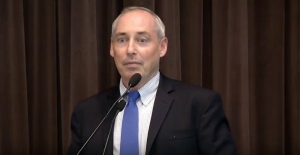Social Work Meets Politics in Campus Forum
October 13, 2016 / by Keith Demolder- Opinion
On Oct. 4, the National Association of Social Workers-USC Unit at the USC Suzanne Dworak-Peck School of Social Work hosted “Election 2016: What’s at Stake? Implications for Social Workers.”
The event, which was held at the USC University Club, featured speakers Dan Schnur, director of the Jesse M. Unruh Institute of Politics at USC who provided an overview on the 2016 presidential election, and Jacquelyn McCroskey, the John Milner Professor of Child Welfare who highlighted relevant policy issues from a social work perspective.
Peter Braun, adjunct lecturer and NASW-USC Unit public policy chair, outlined the purpose of the event as it related to students, faculty, alumni and the event’s speakers.
“We are all here today to understand the national, state and local perspective -- to understand where we are going as a society in the midst of such a confusing and bewildering period. We’re here today as social workers to understand how to understand these times,” he said.
Shantel Vachani, senior lecturer and chair of the NASW-USC Unit, stressed the importance of bringing together students and experts in a collaborative forum.
“We definitely wanted to talk about politics, but we recognize the intrinsic interconnection between politics, policy and practice,” she said. “The goal in bringing together a practitioner who can do policy in the field of social work and an expert in politics and policy is to see how macro, micro and mezzo all come together.”
Setting the stage
Schnur took the floor to speak with the audience about this year’s election with the intent to provide an unbiased view of the candidates and the current political climate.
“My job is to get as many USC students as possible more motivated and more excited about getting involved, not just in traditional politics and government, but in a broader definition of public service,” he said. “The best I can hope to do is to give you a perspective from which to look at the political landscape and then be confident that you will make the informed decisions that are most relevant to your priorities.”
With this independent view in mind, Schnur described the 2016 political and socioeconomic environment, with an emphasis on the background of Bernie Sanders and Donald Trump supporters.
Schnur illustrated that while Sanders and Trump supporters differ strongly, they both fear for their futures.
Citing the economic shift from a primarily industrial-based economy to a technology-based one, Schnur said that the fear Trump supporters feel comes from the unforeseen consequences of this shift.
“Most of those voters are not as angry as they are frightened. From the beginning, there has been a very specific demographic group that has formed the overwhelming majority of Trump’s support base -- white, male, working-class voters, who did not have the benefit of a college education,” Schnur said. “All of a sudden they realized that there was not a place for themselves in a technology-based economy.”
Schnur looked to the other side of the voter spectrum to the predominantly college-educated bloc that supported Bernie Sanders’ rise to prominence. These supporters did all they could to obtain a job but found themselves unemployed, despite graduating with a degree.
“All of these millenials, if not unemployed, are underemployed. Even if they are employed, they are working in jobs that do not take full advantage of their intellectual capacity and creative skills,” Schnur said.
Schnur ended his discussion on the 2016 election by reminding the social workers in the audience that it is this same fear that they will be dealing with in their professional careers.
“You have decided to devote your lives and your careers providing comfort and direction and support to people who are frightened because they don’t know how to overcome the challenges that life has put in front of them,” he said. “What you do has never been more needed and more necessary at any other time in American history than it is now because people don’t know where to turn.”
Policy and politics
McCroskey, who has helped to create and evaluate systems-change initiatives to improve outcomes for families and children in Los Angeles County for more than two decades, presented the election in terms of social work policy and her personal experiences with numerous social programs.
She referred to the failure of the juvenile justice system and questioned the relationship between social problems and the programs created to end them.
“I got a job as a probation officer at Los Angeles Central Juvenile Hall, and after two years of that experience, I realized that -- unlike what people thought -- the problem really was not about the kids. The problem was really the systems and how disconnected these systems were,” McCroskey said.
Commenting on the current state of policy and politics, McCroskey said that although politics are the most direct avenue for changing lives, it is often imperative to have policy and politics work together in harmony.
“We are not where we need to be to make the case for what it is that our agencies and programs do, and how we use that information to inform decision making,” she said. “Policy and politics are always intertwined, and that’s why elections really count because the people we put in office have the opportunity to make things better. Elections determine how resources are distributed, and that is essential to our clients.”
To reference the work of our faculty online, we ask that you directly quote their work where possible and attribute it to "FACULTY NAME, a professor in the USC Suzanne Dworak-Peck School of Social Work” (LINK: https://dworakpeck.usc.edu)
